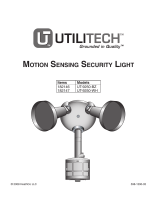Page is loading ...

© 2003 595-5751-02
3. Testing
Caution: Always turn the circuit breaker off when wiring
the fixture.
1. Remove the existing fixture.
2. The plastic hanger can be used to hold the fixture while wiring.
The small end of the plastic hanger can be threaded through the
hole in the center of the cover plate. The small end then goes into
one of the slots on the mounting strap.
3. Connect the light control as shown in Figure 1:
• Black sensor wire to the black (HOT) house wire.
• White sensor wire to the white (NEUTRAL) house wire.
2. Aiming
Figure 2 - Coverage Angles
180°
8 Ft.
70 Ft.
Figure 1 - Wiring at Junction Box Plate
4. Attach the fixture to the mounting strap with the center mounting bolt.
Use a weatherproof sealant to seal the fixture to the junction box.
5. Install the protective lamp shields on the lamp holders by lining
up the groves on the narrow end of the shields with the dimples
in the lamp holders, push the shields into the lamp holders and
turn clockwise slightly.
6. Install the lamps in the lamp holders. Do not over tighten.
7. Adjustment lamp holders. The lamps should be at least 1 inch
away from the sensor.
Caution: Do not mount the sensor above or touching the lamps
(keep 1 inch or more from the lamps). The sensor bottom must be
facing down for best coverage and to avoid water damage and
electrical shock.
Motion Sensing
Light
®
From House
White to white
Black to black
House ground wire to green
ground screw on fixture.
Push the rubber
plug firmly into
place
Specifications:
Total Lighting Wattage...................... Up to 300 Watts Maximum
Lamp Holder Wattage ............... Up to 150 Watts Maximum each
Range ............................................................................ up to 70 ft.
Time Delay ...................................................... 1, 5, or 10 minutes
Caution: This product is to be used with a U.L. listed rain tight or
wet location suitable outlet box. Depending on the installation,
additional hardware may be required.
This light control automatically turns on lights when motion is
detected.
Two lamp holders are provided. The lamp holders are rated at 150
watts max. each.
Note: Installation of this light control should be done only by those
with experience in 120 Volt household wiring. Some local codes
may require that a licensed electrician install the light control.
Models 3108677/3108651/3108669
1. Installation
As an ENERGY STAR
®
Partner, Heath
®
/Zenith has
determined that this product meets the ENERGY
STAR
®
guidelines for energy efficiency. This product
is ENERGY STAR
®
compliant when used with 120
Watt bulbs.
Note: For under-eave installation, rotate the sensor head 180° by
bending the sensor towards the clamp bracket. Rotate the sensor
bottom clockwise away from the bracket.
The coverage area for the sensor is shown in Figure 2. The sensor
should be aimed so that the motion to be detected is in front of and
across the coverage area. The sensor should be aimed looking out at
a horizontal angle. To reduce false triggering, point the sensor away
from traffic areas, air conditioners, dryer vents, water pools, or
anything which may move or change temperature rapidly.
For motion sensing, put the ON-TIME switch on the bottom of the
sensor in the 1, 5 or 10 minute position. When motion is detected, the
lights will come on the selected time. Note: The photocell keeps the
lights from turning on in daylight.
To keep lights on all night, flip the light switch off for 1 second then
back on. Turning the light switch off for 1 second then back on will
return the control to the motion sensing mode. At dawn, the control
will return to the motion sensing mode and shut off.
4. Operation
Turn the power back on at the circuit breaker. Turn the light switch
on.
Note: When first turned on wait about 1
1
/
2
minutes for the circuitry
to calibrate.
Put the TIME switch on the bottom of the sensor in the TEST position.
You can now walk in front of the unit and the lights will come on for
about 5 seconds. The TEST mode works both day and night.
Walk through the coverage area and point the sensor to obtain the
desired coverage area. Adjust sensitivity as needed.
/

